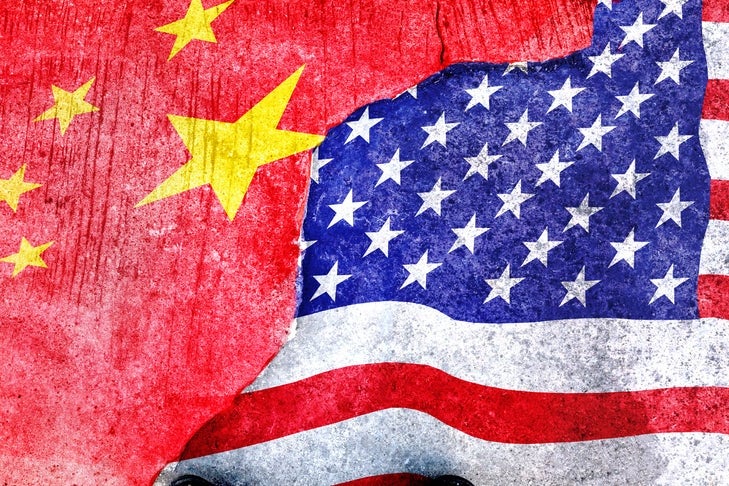Grant Cardone Calls for Chinese Investors to Join U.S. Real Estate Boom
In a bold move, renowned real estate mogul Grant Cardone has issued a clarion call for Chinese investors to engage with American firms in the burgeoning U.S. real estate market. Cardone’s appeal underscores the lucrative potential of U.S. real estate, characterized by its resilience and growth prospects, particularly in urban areas. This invitation not only highlights the opportunities present in the American property landscape but also raises critical questions about the dynamics of international investment in real estate and the implications for both economies.
The Current Landscape of U.S. Real Estate
The U.S. real estate market is experiencing a renaissance, driven by a confluence of factors including low mortgage rates, a robust job market, and increasing demand for residential and commercial properties. According to the National Association of Realtors, home sales surged by 10% in the last quarter, while commercial real estate has seen a steady uptick in investment, particularly in logistics and healthcare sectors.
Key Factors Driving Growth
- Low Interest Rates: The Federal Reserve has maintained relatively low interest rates, making borrowing more accessible for both domestic and international investors.
- Urbanization Trends: Cities like Austin, Nashville, and Miami are witnessing unprecedented population growth, driving demand for housing and commercial spaces.
- Technological Advancements: The rise of remote work has transformed the real estate landscape, increasing interest in suburban and secondary markets.
The Appeal to Chinese Investors
Cardone’s proposal to Chinese investors is strategically timed. With a significant portion of foreign investment in U.S. real estate coming from China, this invitation seeks to rekindle interest in a market that has seen fluctuations due to geopolitical tensions and regulatory changes.
Why Chinese Investors? A Historical Context
Historically, Chinese investors have been major players in the U.S. real estate market, with investments peaking around 2016 when they accounted for nearly 40% of foreign purchases. However, recent years have seen a decline due to tightening capital controls in China and increased scrutiny from U.S. regulators.
Despite these challenges, the U.S. remains an attractive destination for Chinese capital due to its perceived stability, transparent legal framework, and potential for high returns. Cardone’s outreach could potentially reinvigorate this sector by providing a partnership framework for Chinese investors who are looking to diversify their portfolios amidst domestic uncertainties.
Implications for International Investment
Cardone’s call for collaboration between American firms and Chinese investors raises several implications for the future of international real estate investment:
- Increased Competition: A renewed influx of Chinese capital could intensify competition in the U.S. market, potentially driving up prices but also leading to more innovative property developments.
- Regulatory Considerations: As foreign investment increases, regulatory bodies may impose stricter guidelines to ensure compliance and protect national interests.
- Economic Ties: Strengthening U.S.-China investment ties could lead to improved bilateral relations, fostering a more collaborative economic environment.
Challenges Ahead
While the prospects appear promising, several challenges loom on the horizon for this partnership. These challenges include:
- Geopolitical Tensions: Ongoing trade disputes and diplomatic strains between the U.S. and China could complicate investment flows.
- Market Volatility: Economic fluctuations caused by inflation, interest rates, or external shocks may impact investor confidence.
- Cultural Differences: Navigating the intricacies of cross-cultural business practices may pose challenges for both American and Chinese firms.
Broader Implications for the Real Estate Market
The invitation extended by Cardone is not just about attracting foreign investment; it reflects broader trends in globalization and the interconnectedness of real estate markets. The influence of international investors can lead to:
- Diverse Development Projects: Increased foreign investment can lead to a more diverse range of real estate projects, catering to varied demographics and preferences.
- Innovation and Sustainability: Collaboration with international investors can introduce new ideas and practices, particularly in sustainable development and smart technologies.
- Enhanced Global Perception of U.S. Real Estate: A vibrant foreign investment landscape can bolster the U.S. real estate market’s reputation as a prime investment destination.
Conclusion
Grant Cardone’s call to Chinese investors represents a pivotal moment in the ongoing narrative of U.S. real estate. By advocating for collaboration, Cardone not only highlights the unique opportunities available within the U.S. market but also acknowledges the broader implications of international investment dynamics. As both economies navigate the complexities of globalization, the potential partnerships forged in this context could reshape the real estate landscape, offering mutual benefits while also presenting new challenges.
Ultimately, the success of this initiative will depend on the ability of both American and Chinese investors to navigate the intricacies of cross-border investment, align their goals, and create a framework that fosters growth and innovation. As the U.S. real estate market continues to evolve, the collaboration between these two economic powerhouses could very well define its future trajectory.
See more Business Focus Insider Team

